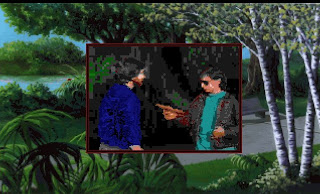As I’ve mentioned in my King’s Quest reviews, Sierra was one of the leading developers of graphic adventure games until the wheels came off the genre. In 1987 a new “quest” game came out with their label on it, but there was nothing too fantastic about this title. Police Quest, designed by Jim Walls, formerly of the California Highway Patrol, was created to be an accurate simulation of police work rather than simply a game where you played a police officer. Having never worked in law enforcement I’m not in a position to comment on its authenticity. However, it certainly feels like it incorporates real law enforcement procedures.
 |
| When you watch the primitive FMV, you might think they tried a little too hard. |
You’re Sonny Bonds, an officer of the law in the town of Lytton, California. You show up for what seems like a routine day in traffic patrol, but in the process of carrying out your normal duties you soon come across evidence of a major drug ring run by the colorfully-named Death Angel.
You may have noticed me pointing out you carrying out your normal duties, and that’s not baloney. Things start out with you pursuing speeders and drunk drivers that have nothing whatsoever to do with the larger plot. There’s no mistaking how they wanted this to be about real police work, and that Sonny is no cop on the edge who plays by his own rules. Try that stuff and you’re looking at an instant game over.
Thanks to this firm grounding in reality, Police Quest is one game where people who hate to read long, boring manuals and prefer to just jump into the game will be screwed. When you book a perp you have to know the numeric codes for their offenses, you’ve got to handle tense situations in a professional and plausible way, and you’ve got to keep your map handy or you could be halfway across town with things stopping every two minutes with dispatch yelling in your ear to get your butt to such-and-such a place.
The game will usually stop and prompt you to adhere to procedure, or at least tell you you’re forgetting something, during parts of the game. Usually when you’re dealing with a hardened criminal, though, you screw up once and it’s time to load your last save. Also, even if you know exactly what to do, all the intricate procedures (every single time you go to the county lock-up, you have to check your gun, for example) and the backtracking they sometimes require make the game feel a lot longer than it really is. Or maybe, really needs to be. After a while the novelty of a realistic depiction of being a cop wore off, and the game got kind of tedious.
Also, for a game that sells itself on being so true-to-life, there were parts that strained my credulity. The one I can’t ignore is this: is it smart to send someone like Sonny Bonds undercover to bust the head of the city’s drug trafficking? By that I mean someone who was spotlighted in the media for winning the Officer of the Year award.
 |
| As it turns out, NO! |
And just so nobody can say I didn’t mention it, this game isn’t afraid to be a little graphic in its pursuit of realism.
I didn’t find the nuts and bolts of police regulation to be much of a substitute for interesting puzzles. I’m not saying this is a bad game or anything. It’s just that sometimes a longer game isn’t always more entertaining. Especially if you regularly have to step back from the world they’re trying to suck you into to get a particular offense code out of the manual.







No comments:
Post a Comment